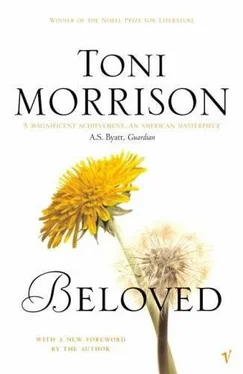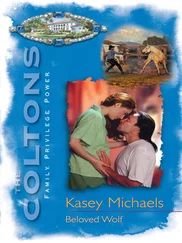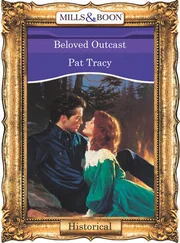"What'd he leave then if not me?"
"I don't know, but it wasn't you. That's a fact."
"Then he did worse; he left his children."
"You don't know that."
"He wasn't there. He wasn't where he said he would be."
"He was there."
"Then why didn't he show himself? Why did I have to pack my babies off and stay behind to look for him?"
"He couldn't get out the loft."
"Loft? What loft?"
"The one over your head. In the barn."
Slowly, slowly, taking all the time allowed, Sethe moved toward the table.
"He saw?"
"He saw."
"He told you?"
"You told me."
"What?"
"The day I came in here. You said they stole your milk. I never knew what it was that messed him up. That was it, I guess. All I knew was that something broke him. Not a one of them years of Saturdays, Sundays and nighttime extra never touched him. But whatever he saw go on in that barn that day broke him like a twig."
"He saw?" Sethe was gripping her elbows as though to keep them from flying away.
"He saw. Must have."
"He saw them boys do that to me and let them keep on breathing air? He saw? He saw? He saw?"
"Hey! Hey! Listen up. Let me tell you something. A man ain't a goddamn ax. Chopping, hacking, busting every goddamn minute of the day. Things get to him. Things he can't chop down because they're inside."
Sethe was pacing up and down, up and down in the lamplight.
"The underground agent said, By Sunday. They took my milk and he saw it and didn't come down? Sunday came and he didn't. Monday came and no Halle. I thought he was dead, that's why; then I thought they caught him, that's why. Then I thought, No, he's not dead because if he was I'd know it, and then you come here after all this time and you didn't say he was dead, because you didn't know either, so I thought, Well, he just found him another better way to live.
Because if he was anywhere near here, he'd come to Baby Suggs, if not to me. But I never knew he saw."
"What does that matter now?"
"If he is alive, and saw that, he won't step foot in my door. Not Halle."
"It broke him, Sethe." Paul D looked up at her and sighed. "You may as well know it all. Last time I saw him he was sitting by the chum. He had butter all over his face."
Nothing happened, and she was grateful for that. Usually she could see the picture right away of what she heard. But she could not picture what Paul D said. Nothing came to mind. Carefully, carefully, she passed on to a reasonable question.
"What did he say?"
"Nothing."
"Not a word?"
"Not a word."
"Did you speak to him? Didn't you say anything to him? Something!"
"I couldn't, Sethe. I just…, couldn't."
"Why!"
"I had a bit in my mouth."
Sethe opened the front door and sat down on the porch steps.
The day had gone blue without its sun, but she could still make out the black silhouettes of trees in the meadow beyond. She shook her head from side to side, resigned to her rebellious brain. Why was there nothing it reused? No misery, no regret, no hateful picture too rotten to accept? Like a greedy child it snatched up everything. Just once, could it say, No thank you? I just ate and can't hold another bite? I am full God damn it of two boys with mossy teeth, one sucking on my breast the other holding me down, their book-reading teacher watching and writing it up. I am still full of that, God damn it, I can't go back and add more. Add my husband to it, watching, above me in the loft-hiding close by-the one place he thought no one would look for him, looking down on what I couldn't look at at all.
And not stopping them-looking and letting it happen. But my greedy brain says, Oh thanks, I'd love more-so I add more. And no sooner than I do, there is no stopping. There is also my husband squatting by the churn smearing the butter as well as its clabber all over his face because the milk they took is on his mind. And as far as he is concerned, the world may as well know it. And if he was that broken then, then he is also and certainly dead now. And if Paul D saw him and could not save or comfort him because the iron bit was in his mouth, then there is still more that Paul D could tell me and my brain would go right ahead and take it and never say, No thank you. I don't want to know or have to remember that. I have other things to do: worry, for example, about tomorrow, about Denver, about Beloved, about age and sickness not to speak of love.
But her brain was not interested in the future. Loaded with the past and hungry for more, it left her no room to imagine, let alone plan for, the next day. Exactly like that afternoon in the wild onions- when one more step was the most she could see of the future. Other people went crazy, why couldn't she? Other people's brains stopped, turned around and went on to something new, which is what must have happened to Halle. And how sweet that would have been: the two of them back by the milk shed, squatting by the churn, smashing cold, lumpy butter into their faces with not a care in the world.
Feeling it slippery, sticky-rubbing it in their hair, watching it squeeze through their fingers. What a relief to stop it right there. Close. Shut.
Squeeze the butter. But her three children were chewing sugar teat under a blanket on their way to Ohio and no butter play would change that.
Paul D stepped through the door and touched her shoulder.
"I didn't plan on telling you that."
"I didn't plan on hearing it."
"I can't take it back, but I can leave it alone," Paul D said.
He wants to tell me, she thought. He wants me to ask him about what it was like for him-about how offended the tongue is, held down by iron, how the need to spit is so deep you cry for it. She already knew about it, had seen it time after time in the place before Sweet Home. Men, boys, little girls, women. The wildness that shot up into the eye the moment the lips were yanked back. Days after it was taken out, goose fat was rubbed on the corners of the mouth but nothing to soothe the tongue or take the wildness out of the eye.
Sethe looked up into Paul D's eyes to see if there was any trace left in them.
"People I saw as a child," she said, "who'd had the bit always looked wild after that. Whatever they used it on them for, it couldn't have worked, because it put a wildness where before there wasn't any. When I look at you, I don't see it. There ain't no wildness in your eye nowhere."
"There's a way to put it there and there's a way to take it out. I know em both and I haven't figured out yet which is worse." He sat down beside her. Sethe looked at him. In that unlit daylight his face, bronzed and reduced to its bones, smoothed her heart down.
"You want to tell me about it?" she asked him.
"I don't know. I never have talked about it. Not to a soul. Sang it sometimes, but I never told a soul."
"Go ahead. I can hear it."
"Maybe. Maybe you can hear it. I just ain't sure I can say it. Say it right, I mean, because it wasn't the bit-that wasn't it."
"What then?" Sethe asked.
"The roosters," he said. "Walking past the roosters looking at them look at me."
Sethe smiled. "In that pine?"
"Yeah." Paul D smiled with her. "Must have been five of them perched up there, and at least fifty hens."
"Mister, too?"
"Not right off. But I hadn't took twenty steps before I seen him.
He come down off the fence post there and sat on the tub."
"He loved that tub," said Sethe, thinking, No, there is no stopping now.
"Didn't he? Like a throne. Was me took him out the shell, you know. He'd a died if it hadn't been for me. The hen had walked on off with all the hatched peeps trailing behind her. There was this one egg left. Looked like a blank, but then I saw it move so I tapped it open and here come Mister, bad feet and all. I watched that son a bitch grow up and whup everything in the yard."
Читать дальше











